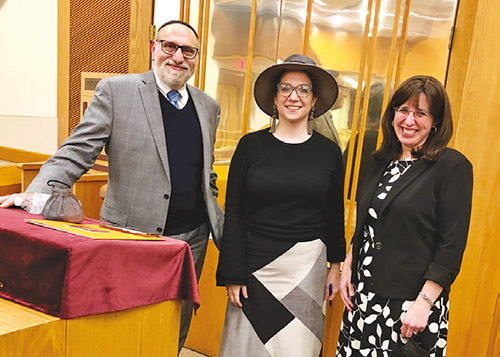



On Motzei Shabbat, November 20, the Orthodox Forum of Edison/Highland Park hosted Dr. Rivka Press Schwartz to address “Race, Class, and Modern Orthodox Life,” in a talk (both live and broadcast on Zoom) held at Congregation Ahavas Achim in Highland Park.
Press Schwartz is eminently qualified to talk on this challenging social concern.She is a trained academic who publishes and speaks widely. She earned a Ph.D. in History of Science from Princeton University, writing her dissertation about the cultural history of the Manhattan Project. She has served as an adjunct professor of history at Yeshiva and Stern Colleges. She is also a fellow of the Kogod Research Center at the Shalom Hartman Institute of North America. She lectures frequently on issues of contemporary importance in the Orthodox community.
She also serves as associate principal of general studies at SAR High School in the Bronx, New York and in this role, she has regular and prolonged contact with both teens and alumni/young adults who grapple with the “burning issues” of the day.
Press Schwartz started her talk with an assertion that “Our stories can get in the way of hearing other people’s stories.” She went on to illustrate this idea by sharing her personal story of her maternal grandfather, who fled persecution in Poland and immigrated to the US in the 1930s. Yehuda Kaprinski, who took the name Julius Cooper, served as an American soldier in World War II and afterwards started a family. He took a job selling real estate and worked hard, building a successful career.
While taking pride in her family story, and suggesting that it aligns with other American Jewish family stories, Dr. Press Schwartz said that families with such stories may look at other groups and wonder why they have not thrived given the opportunities the United States offers.
She asserted, drawing frequently on respected sources and published accounts, that—due to the prevailing politics in the generation they were enacted—well known US federal government programs were designed not to benefit African Americans. She cited two examples:
- The Social Security Act of 1935, which explicitly excluded two categories of employees—agricultural workers and domestics, both of which were predominantly Black work forces;
- The GI Bill of 1944, which provided education and housing assistance to returning US soldiers, was often of no use to Blacks because most universities at the time were not accepting them and many real estate firms, because of redlining practices, would only show them homes in poor areas, while banks were reluctant to make loans to house sales in those areas.
Press Schwartz also shared a few instances of recent American history, such as the Tulsa Race Massacre of 1921, the 3,000+ documented extrajudicial lynchings of Blacks suspected of crimes or offenses against whites, and the off-the- books interrogation and torture site run by the Chicago police which often targeted minority citizens and was uncovered in 2015. She stated that these episodes and many others illustrate that when it comes to the legal system and law enforcement, African Americans have had—and continue to have—far different experiences and expectations than do members of Jewish communities.
She stated that, in response to these well documented accounts: “As a community it’s incumbent that we hold our stories to be true and, at the same time, we must be open to hearing that our truth is not universal. Other stories can be true, too, and we can embrace a more complex truth.” She suggested that while the Jewish community is justifiably alarmed by and vigilant against recent acts of antisemitic violence, we can, at the same time, recognize that we have been perceived as and benefited from being “white enough” in US society.
Press Schwartz took questions from the audience, some of which touched on the depth of antisemitism in public life in the 1900s, the complexity of anti-racism efforts, and perception of widespread anti-Israel/anti-Semitic sentiment facing Jews on college campuses today. She acknowledged antisemitism in college admissions in the 1900s, while pointing out the great inequities in legal protections to Jews vs Blacks. She urged audience members not to dismiss all efforts at diversity, equity and inclusion (DEI) just because of some examples of “bad DEI” work, and stated that the vast majority (80%) of the alumni she is in contact with attend a range of universities and they do not speak of feeling beleaguered as Jews.
Commenting afterwards, Andrew Getraer of Highland Park said: “I’m extremely impressed with her knowledge of history and her ability to apply it to current conversations on race in America and our Jewish experience as Americans.”
Milton Erdfarb of Highland Park remarked: “It was good to hear truth to power from someone who did the research to back up her presentation. I’m sure it opened up many people’s eyes who were unaware of many of the historical insights she documented.”
“It was a very interesting talk,” said Felix Urman of Highland Park. “She smartly avoided any prescriptions for action and instead focused on something more fundamental and non-controversial—historical facts, to help us understand others’ experiences.”
Mark Abraham, chair of the Orthodox Forum, stated: “Dr. Press Schwartz challenged us to come to grips with the reality of American history, and that as Jews, we have to understand that there are groups that have not had the opportunities that we have; admitting that doesn’t take anything away from the Jewish American experience.”
To see Press Schwartz’s presentation online, go to: https://tinyurl.com/3dp58dme










